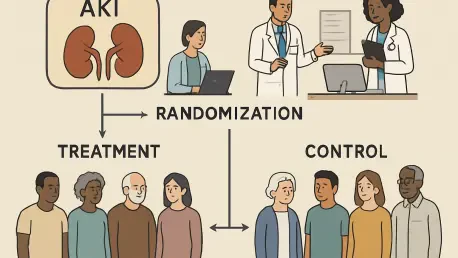In a landscape where acute kidney injury (AKI) continues to pose a formidable challenge for critically ill patients, a groundbreaking clinical trial is making strides that could reshape treatment paradigms. Based in Denver, a commercial-stage healthcare company has reached a pivotal point in its mission to improve outcomes for those requiring continuous renal replacement therapy (CRRT). With over 60% of the target enrollment achieved in its NEUTRALIZE-AKI trial, this initiative is not only a beacon of hope for patients but also a testament to the power of collaborative medical research. The trial focuses on evaluating an innovative therapy that could potentially reduce mortality rates and long-term dialysis dependency, addressing a significant unmet need in intensive care settings. This progress marks a crucial step forward in tackling one of the most pressing issues in critical care medicine today.
Progress in Clinical Research
Enrollment Milestone Achieved
Significant advancement has been reported in the NEUTRALIZE-AKI trial, a pivotal study designed to assess the efficacy and safety of a novel therapy for adult AKI patients on CRRT. The trial has successfully enrolled 125 out of the targeted 200 participants, surpassing the 60% mark. This achievement reflects the dedication of the research team and the growing interest from medical centers in addressing the dire outcomes often associated with AKI. The addition of a new clinical site in San Antonio, Texas, at Methodist Hospital Metropolitan, has further bolstered recruitment efforts. This site joins a network of 16 locations, enhancing the trial’s reach and capacity to gather diverse patient data. Such milestones are critical, as they ensure the study remains on track to deliver meaningful results that could influence future treatment protocols for this vulnerable population, while also highlighting the scalability of the trial’s operational framework.
Expanding Research Network
The expansion of the clinical trial network to include prominent institutions underscores the widespread recognition of the urgent need for improved AKI treatments. Renowned centers such as Cleveland Clinic, Mayo Clinic, and Stanford Medical Center are among the 16 active sites, contributing to a robust and varied dataset. The inclusion of Methodist Hospital Metropolitan as a new site is expected to accelerate enrollment, building on the strong performance of its affiliate, which ranks among the top enrollers in the study. This strategic growth not only enhances the trial’s logistical efficiency but also fosters collaboration among leading healthcare providers. By engaging a diverse array of medical facilities, the study aims to capture a comprehensive picture of the therapy’s impact across different patient demographics and clinical environments, ultimately strengthening the validity and applicability of the findings in real-world settings.
Trial Design and Future Outlook
Key Objectives and Endpoints
The NEUTRALIZE-AKI trial, formally titled as a randomized clinical study focusing on neutrophil and monocyte deactivation, is meticulously structured to evaluate whether the Selective Cytopheretic Device (SCD) therapy, used alongside standard CRRT, can outperform CRRT alone. The primary endpoint centers on a composite measure of 90-day mortality or dialysis dependency, a critical indicator of long-term patient outcomes. Secondary endpoints delve into 28-day mortality, ICU-free days within the first 28 days, major adverse kidney events at 90 days, and dialysis dependency at one year. Additionally, subgroup analyses aim to explore the therapy’s effectiveness in AKI patients with complicating conditions like sepsis and acute respiratory distress syndrome. This comprehensive approach ensures that the trial addresses both immediate and sustained impacts of the therapy, offering a nuanced understanding of its potential to transform care for critically ill individuals facing complex health challenges.
Interim Analysis and Safety Focus
An important upcoming milestone for the trial is the interim analysis scheduled for the third quarter of this year, which will review data from the first 100 enrolled patients. Conducted by an independent Data Safety Monitoring Board (DSMB), this evaluation will focus on the primary endpoint while prioritizing the therapy’s safety profile and potential efficacy. To preserve the integrity of the ongoing study, only the top-line decision from the DSMB’s review will be shared with stakeholders. The trial’s design has been praised for its rigor, with a strong emphasis on detecting a true efficacy signal while safeguarding patient well-being. The outcome of this interim analysis will play a pivotal role in determining whether the study continues to full completion, potentially shaping the trajectory of AKI treatment innovation. This step reflects a cautious yet determined effort to balance scientific discovery with ethical responsibility in clinical research.
Reflecting on Milestones Achieved
Looking back, the journey of the NEUTRALIZE-AKI trial showcases remarkable progress in both enrollment and network expansion, highlighting a steadfast commitment to advancing care for AKI patients. The collaborative spirit among leading medical institutions played a crucial role in reaching over 60% of the enrollment target and integrating new clinical sites into the fold. Each step forward, from achieving key recruitment numbers to setting the stage for interim analysis, reflects a meticulous focus on improving survival rates and reducing long-term dialysis needs. As the trial moves through its phases, the dedication to robust endpoints and patient safety remains evident, setting a high standard for clinical research in critical care. Moving ahead, stakeholders are encouraged to monitor the outcomes of the interim analysis, as these insights could pave the way for innovative treatment options. Continued collaboration and data synthesis will be vital in translating these findings into tangible benefits for patients worldwide.









